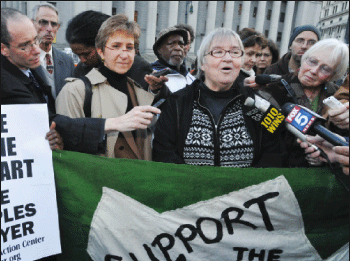By Mary Reinholz
Lynne Stewart, the leftist ex-lawyer now behind bars at the Metropolitan Correctional Center, at 150 Park Row, is scheduled to appear Dec. 2 in U.S. District Court, where her trial judge may possibly consider lengthening her 28-month sentence for passing messages from an imprisoned terrorist client to his extremist followers in Egypt.
Stewart’s bail was revoked Nov. 17. Two days later, she began serving jail time after a panel of three judges on the U.S. Court of Appeals, Second Circuit, upheld her 2005 conviction and ordered Federal Judge John G. Koeltl to determine if she lied at trial and deserved her 2006 sentence, which one of the justices described as “breathtakingly low” and a “slap on the wrist.”
Government prosecutors had asked that Koeltl give Stewart a 30-year-sentence. But Koeltl sentenced her to 28 months after citing Stewart’s personal qualities and extensive pro bono work for the poor and disadvantaged. Her co-defendant Mohammed Youssry, an Arabic translator, received a sentence of 20 months. Another co-defendant, Ahmed Abdel Sattar, a former U.S. postal worker and paralegal, is currently serving 24 years.
Before she became inmate #53504-054 at the MCC-NY on Nov. 19, Stewart had been free on $500,000 bond since 2002 after pleading “not guilty” to charges that she materially aided terrorism and defrauded the U.S. government in her advocacy for Sheikh Omar Abdel-Rahman, a fundamentalist Islamic cleric whom she had defended at his trial. In 1995, he was convicted of conspiracy to blow up New York City landmarks, including the World Trade Center, and sentenced to life in a prison hospital.
A central charge against Stewart, now 70 and recovering from breast cancer, is that she issued a press release for the blind sheik to a Reuters reporter in Cairo in which he called on members of the Islamic Group, designated as a terrorist organization by the U.S., to reconsider its ceasefire with the Egyptian government. Assistant U.S. Attorney Andrew Dember called the press statement a “call to arms.” Stewart said she was trying to ease the ailing sheik’s isolation. She noted no terrorist act resulted from the statement.
During a telephone interview, Joshua L. Dratel, Stewart’s lead lawyer, said that Stewart was not tried for breaking prison rules, known as special administration measures — in which she signed agreements that severely limited the sheik’s communications with the outside world — but rather on anti-terrorist statutes and a superseding indictment contending she conspired to provide support to a terrorist organization overseas that engaged in kidnapping, murder and mayhem.
“But our position is that there was no [such] intent,” Dratel said. “We don’t think Lynne committed a crime and we think the judge got it right the first time.” Dratel contended that other lawyers representing the sheik, including former U.S. Attorney General Ramsey Clark, had engaged in similar conduct as Stewart but were not indicted, “so this was a selective prosecution,” he said. “She’s an easy target.”
About 75 of Stewart’s friends and supporters shouted, “Free Lynne Stewart!” and “We love you, Lynne!” outside the Daniel Patrick Moynihan Federal Courthouse in Foley Square shortly before she embraced her husband, Ralph Poynter, and surrendered to U.S. marshals on Nov. 19. Her Web site, www.lynnestewart.org, calls on allies to “pack the court” during her appearance before Judge Koeltl at the courthouse on 500 Pearl St.































